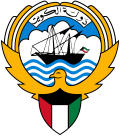 | |
Kuwait | United Arab Emirates |
|---|---|
The United Arab Emirates has an embassy in Kuwait City, and Kuwait maintains an embassy in Abu Dhabi and a consulate-general in Dubai. Both countries are part of the Gulf Cooperation Council, Arab world, and Middle East region and share close cultural ties.
